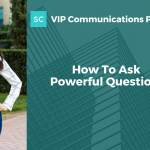Communicating Confidently As An Extrovert
Most people assume extroverts are confident communicators. And while many extroverts are, being an extrovert doesn’t necessarily guarantee you will be confident in your communications.
The good news is, you can learn how to become more confident.
As an extrovert, your innate qualities lend themselves to being a good communicator. The key is to hone your communication skills.
Below you will find three strategies to help you communicate confidently as an extrovert.
1. Less Is More
As an extrovert, you may feel the need to carry conversations, or speak when there is a lull in the conversation. However, if you want to be a more effective communicator, focus on speaking less. This means being mindful of the quality, rather than the number of words you say.
Consider the following as you approach conversations:
- Adding Value – When you are engaged in conversations, think about the reasons behind why you are speaking. Be sure you are adding value to the conversation before you speak. For example, if you are in a meeting and someone has asked a question – do you actually know the answer, or are you responding because no one else is? When you speak, think about whether or not your message is adding value to the conversation.

- Clear + Concise – Often, extroverts are known for using lots of words because they enjoy speaking. And while this can be okay in casual conversations amongst friends, you need to be clear and concise when in the workplace. When you are clear and concise, everyone easily understands your message. One way to be clear and concise is to think about the number of words you use to ask a question. Consider the following two examples:
Option #1 – “Hi Mary, I was just wondering what you were doing? If you’re busy? And also, did you want to come to help me finish doing some filing today? Maybe after lunch? Whenever.”
Option #2 – “Hi Mary! Would you be free to help me finish filing these reports after lunch today?”
As you can see, you are being more clear and concise in option two. Being clear helps your audience understand what you need.
- Silence Is Okay – Most people don’t like lulls or silences in conversations. However, silences and lulls are part of communications. As an extrovert, you don’t need to feel pressure to fill the silence. For example, sometimes lulls or silences can indicate a conversation has come to a natural end. Remember, conversations are between two or more people. You don’t have to be the only person making the conversation continue.
When you focus on adding value to the conversations, you will feel less pressure to talk to fill a void. When you know your message holds value, you will be more confident when communicating.
2. Actively Listen
If you are an extrovert, you may find yourself speaking more than you are listening. However, actively listening will help you become a more confident communicator. This is because if you aren’t listening to other people, you won’t respond appropriately. You may also lose credibility if others believe you never take the time to hear what other people are saying. Because of this, you will want to practice active listening.
There are several ways to boost your active listening skills:
- Body Language – Your body language lets others know whether or not you are genuinely paying attention. To show you are actively listening with body language, you will want to make sure you are making eye contact with the person speaking. Always face the speaker so you can see them. You can also use gestures to show you are paying attention. For example, nodding your head will indicate to the speaker you hear and understand what they are saying. Slight changes to your body language will help you show you are actively listening.

- Avoid Distractions – When someone else is speaking, you need to avoid all distractions. This means putting your phone on silent or in your pocket. If you are sitting at your desk, you can turn away from your computer screen to show the other person they have your undivided attention. Try not to look at your watch. The more focused you can be on the person speaking, the more you will appear to be actively listening to them.
- Respond Appropriately – When you actively listen to someone, you will want to make sure your response acknowledges what the other person said. For example, you can paraphrase what you’ve heard them say. You can say, “What I heard you say was xyz.” Or you can say, “When you said xyz, did you mean this?” When you acknowledge what the other person said, you show them you were listening, and their message holds value.
As you listen, keep in mind your body language and avoid any distractions. Be sure to respond appropriately, so the speaker knows you have listened to their message.
3. Remember Others
If you are an extrovert, you may find yourself carrying conversations. When you are in the workplace, you want to make sure you are considering others as you speak. This will show you care about others and can be a team player.
There are several ways to remember others in your communications:
- Ask Others – Inviting others into the conversation is a great way to be seen as a confident communicator. When you do this, you show you value other people’s perspectives. For example, you can ask another person into the conversation by saying, “June, what do you think about xyz?” Or you can call on someone during a meeting when you know they have something to offer. For example, you can say, “I think the deadline is Thursday, but I believe June knows for sure. June, when is the deadline?” Inviting others into the conversation builds goodwill between you and your coworkers.
- Communication Channels – Just because you love to talk in front of coworkers doesn’t mean everyone does. Being a confident communicator means you can communicate in several different ways. For example, let’s say you have a coworker who simply doesn’t like to speak face to face. Consider emailing this coworker. Or, you can direct message. Communicating through several channels will help you become a more confident and effective communicator. This is because you can communicate with everyone the way they prefer.
- Don’t Dominate – Being an extrovert means you may find yourself dominating conversations. This means you don’t allow others to speak or let others finish what they are saying. You don’t want to have this kind of reputation. Make sure you are allowing someone to finish their thoughts before you speak. One way to do this is to wait for a pause. For example, if Sandra is explaining something to a group of people and you want to add to her explanation, wait until she has paused. Make sure she doesn’t have anything else to say, and then speak. Making sure others can have and finish messages is important in the workplace.
It is important for an extrovert to remember others. Be sure to include others in your conversations and not speak over anyone. This will help you be seen as a confident and effective communicator.
Being an extrovert can help you become an excellent communicator. As you hone your communication skills, you will become more confident and build your credibility in the workplace.
__
Whenever you’re ready, there are 3 ways we can help you:
- Discover your communications style so you know where to start. Over 4,000 people have found theirs here.
- Attend our monthly communication workshop to build communications confidence (new topics: public speaking, advocating for yourself, building credibility, etc) here.
- Get your brand in front of 43k+ people by sponsoring our newsletter or Soulcast Media | LIVE LinkedIn events [contact: hello@soulcastmedia.com]











